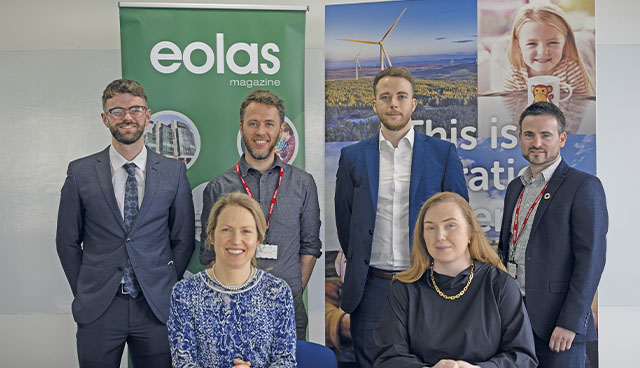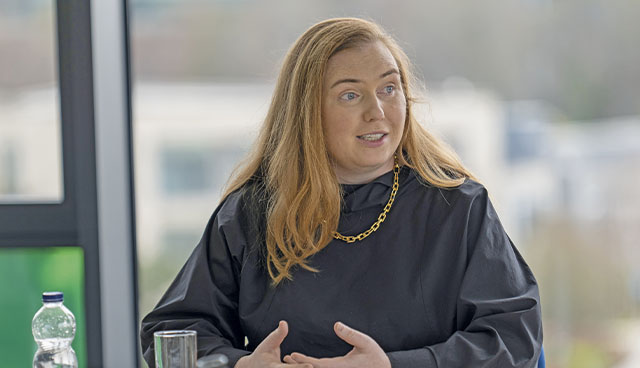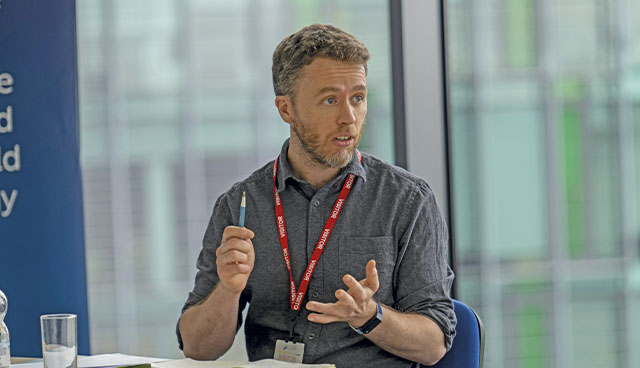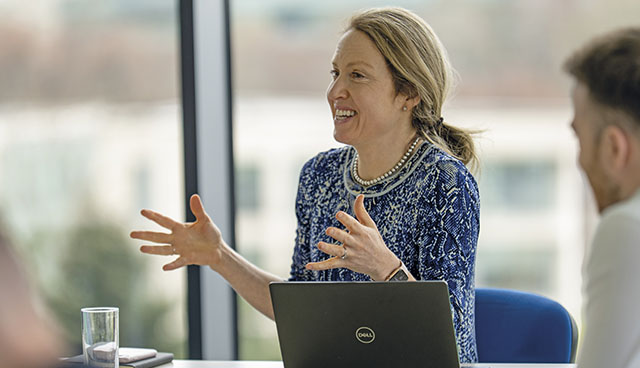Hydrogen: Decarbonising Ireland’s economy

SSE hosted a round table discussion with key stakeholders discussing the role of green and low-carbon hydrogen in Ireland’s decarbonisation ambitions.
What are the benefits of green hydrogen production?
Oonagh O’Grady
At the core of the opportunity for Ireland is our wind and renewable ambitions. We have a stated target from government of 5GW of offshore wind, but we also have the Programme for Government noting the further opportunities of floating wind on the west coast. That creates the opportunity to export power but will require the conversion of some of that power for storage, which hydrogen offers. Hydrogen is a solution for multiple sectors, but it needs cross-sector collaboration to build a business case.
James Carton
The potential for hydrogen is only matched by the potential for renewables. To get our entire energy system to zero carbon, we need 20-40GW of wind. Our system will use 5-6GW of energy at any one time for electricity. Ireland has the potential to export 2 per cent of global hydrogen need. The problem for hydrogen is not on the production side, it is the demand side, and the potential has to be matched by industry taking on the use case for hydrogen for their applications, and where it should fit, where it works and where the least amount of supports from government should be pushed through.
Caoimhe Donnelly
The focus for decarbonising transport is on electrification and for the public transport system this is being delivered through DART Plus for 70 per cent of rail journeys and through the NTA BusConnects programme. Battery electric will deliver over 70 per cent of zero emission public transport journeys however, as we grow and develop public transport, increasing frequency and extending 24-hour services there will be an increasing demand for flexible fuel and a complementary zero emission technology for longer journeys. We are looking for solutions that can facilitate the whole of the public transport system and that is where hydrogen comes in. Testing and understanding is key. For us, working with hydrogen technology has the potential to complement our transition to battery electric.
Ciarán Murphy
Hydrogen could be the leading contender to deliver on-demand power generation to help us reach net zero power in the future, and there is significant potential for hydrogen supply in Ireland, but I think it is important that we properly identify all the demand side uses of hydrogen. I have been involved in research which looked at heat demand, future heat technologies and decarbonisation pathways for the heat sector, which highlighted that non-hydrogen technologies are most suitable for low and medium temperature heat use cases and that hydrogen is likely more suited to the transport and power sectors, for example, with, additionally, some industry sector use cases.

“It is worth remembering that hydrogen is a premium fuel and will continue to be for the foreseeable future, so in terms of value for money, electrification appears the best solution for domestic heat.” Oonagh O’Grady
How can hydrogen be used in the electricity sector?
Oonagh O’Grady
Multiple solutions will be required to decarbonise the electricity sector, including storage. We are still assessing a number of technologies in relation to long-duration storage, but I think hydrogen has a role, acting as a mechanism to increase the duration over which you are able to store electricity by conversion. Alongside decarbonisation, global events have shone a spotlight on volatility in the electricity sector and the importance of security of supply, and this presents an opportunity for hydrogen across multiple sectors.
Additionally, as we build out to take advantage of our natural assets in the form of offshore wind, we are going to require a number of routes to market. We know how much generation from offshore wind our system in Ireland can take but our opportunity is bigger than that when we consider the exportation of electricity and of hydrogen. However, if we are seeking to export, we need to develop low-carbon hydrogen standards.
We also believe that hydrogen-powered thermal generation can provide the flexibility to support Ireland’s 80 per cent RES-E ambition and beyond. Some form of financial support will likely be needed given the high costs of establishing a hydrogen infrastructure. Business models need to be agreed which clarify areas such as key risks and obligations, contractual support and liability.
James Carton
I agree that there is huge potential for hydrogen in the electricity sector but electricity generation from hydrogen at large scale is probably 10 years away in Ireland. However, there is some low hanging fruit. Data centres, for example, which need large energy back up and are reliant on fossil fuels, present options for pilot schemes or small deployment in the next five years. It is worth noting that a small combined-cycle gas turbine (CCGT) uses as much hydrogen per hour as what it would take to run 50 cars per year, so it goes back to ensuring we have the hydrogen production to meet these deployments. The challenges are not technology restrictions but ensuring there is an urge from industry, government and policy to push us towards a cleaner way of producing energy.
The EU needs to get to grips with the definition of green hydrogen. They have given us a broad parameter of it, but the reality is that you could produce hydrogen from coal and still probably fall in that parameter. Ireland’s hydrogen should be green and very low carbon.
Caoimhe Donnelly
Hydrogen can play a role in supporting increased renewable energy generation and enabling energy and transport systems integration. As the biggest fuel importers on the island, we hedge our fuel prices. With a shift to hydrogen, and a conversion to battery electric, there is the potential to obtain greater energy security and move away from the volatility in the fossil fuel market and ensure some security in terms of price and supply. In terms of our demand and the price we would require to make hydrogen viable, a large transition is needed. There is a huge opportunity for Ireland to produce hydrogen for export but if we want to utilise it in the domestic economy, in the transport sector for example, we need to provide opportunities for early stage market development capturing benefits to decarbonise electricity and transport.
Ciarán Murphy
There are strong opportunities for research in this area on how to apply the EU’s Energy System Integration Strategy in the most holistic, sensible way for Ireland. In energy, for example, assessing the opportunity for inter-seasonal storage and what the appropriate hydrogen storage medium is are important questions which need answering if the electricity sector is to run sustainably and securely.

“District heating, heat pumps and potentially biomass for some rural areas are all great solutions to the decarbonisation of heat and so when trying to cultivate the most appropriate demand side uses for hydrogen, it is probably better to focus on bigger opportunities such as transport and power.” Ciarán Murphy
How will green hydrogen be used to heat Irish homes and businesses?
Ciarán Murphy
Leaning on Codema’s Dublin Region Energy Master Plan, a spatialised analysis of the demand in the Dublin area and pathways to net zero across the Dublin region, one of the strongest pieces of evidence was the enormous potential for district heat to serve over 80 per cent of non-industry heat demand. This evidence was matched in the recent SEAI National Heat Study which shows up to 50 per cent of non-industry heat nationwide could be served by district heat. District heating, heat pumps and potentially biomass for some rural areas are all great solutions to the decarbonisation of heat and so when trying to cultivate the most appropriate demand side uses for hydrogen, it is probably better to focus on bigger opportunities such as transport and power.
We do need to start thinking about the important strategic decisions that will need to be made on the gas grid. The recent SEAI National Heat Study looked at decarbonised gas use for homes and the public and commercial sectors and the results showed that this scenario was not compatible with our current carbon budgets to 2030 and had the highest cumulative emissions to 2050. So, there is a role for the gas grid, but we need to have a balanced conversation about what that will look like.
James Carton
Heat is generally low quality and inexpensive, so using hydrogen to heat millions of homes is inefficient. However, there is a push to put hydrogen into the gas grid. I think it is part of the solution but certainly not all of the solution. I expect the 700,000 or so customers currently on the gas grid to decrease significantly as other heating solutions, such as district heating and heat pumps grow, and by 2040 we could potentially be looking at only around 100,000 customers connected to the gas grid in the cities of Dublin, Limerick and Cork. For heavy industry and for anything under 300OC electrification is the solution but over and above that, fuel is most beneficial and fuel in the future is going to be biomethane or green hydrogen.
Oonagh O’Grady
I agree that in relation to heat, the potential for hydrogen lies in the industrial heat processes. The power system has a stick in that we have to decarbonise the system, but I think hydrogen also provides for the decarbonisation of large industries, such as cement. It is worth remembering that hydrogen is a premium fuel and will continue to be for the foreseeable future, so in terms of value for money, electrification appears the best solution for domestic heat.

“The challenges are not technology restrictions but ensuring there is an urge from industry, government and policy to push us towards a cleaner way of producing energy.” James Carton
What role will hydrogen have in decarbonising the transport sector?
Caoimhe Donnelly
Hydrogen is a premium fuel and so electrification remains the solution best suited to decarbonising at least 70 per cent of public transport journeys. However, as we seek to drive, develop, and grow the public transport network, hydrogen offers flexibility around long-distance range and frequency. It also offers diversification in our fuel reliance, which is important when you consider the requirements of electrification across our decarbonisation ambitions.
James Carton
I think public transport has a leadership role. The public need to get behind the decarbonisation agenda and the visibility offered by utilisation of technologies such as hydrogen through public transport is important in helping with that. Offering flexibility to the transport sector is also important when you consider that a Heavy Good Vehicle (HGV) is weight restricted, in that an extra tonne of weight for batteries is a tonne less of goods that can be transported.
Remember, while deploying hydrogen in relation to transport at scale may not be fully cost-effective now, in the future, when levels of renewable electricity and the potential for hydrogen are much greater and large scale hydrogen storage exists; transport will be a small portion of our energy need. Green hydrogen could effectively fuel all public transport for free.
Caoimhe Donnelly
If we are going to stimulate a hydrogen economy, we need to plan ahead and support low carbon infrastructure development in order to meet our 2030 emission targets. We need to put the infrastructure and policies in place to enable investment around large scale hydrogen production in Ireland.
Oonagh O’Grady
I think if we look at our individual industries and try to build a business case for hydrogen, it does not work. It is a cross-sectoral challenge for a reason. So, we can talk about timelines for different aspects, but it is actually bringing that cohesively into a hydrogen strategy from government that is going to make this combined business case work.

“Battery electric will deliver over 70 per cent of zero emission public transport journeys however, as we grow and develop public transport, increasing frequency and extending 24-hour services there will be an increasing demand for flexible fuel and a complementary zero emission technology for longer journeys.” Caoimhe Donnelly
How can Ireland cultivate a hydrogen value chain? What are the major challenges?
James Carton
Hydrogen did not appear in detail on any government document until 2018, and even then, it was to explain that methane contained both carbon and hydrogen. Today government are planning a hydrogen strategy; this is a big shift and so it is important that that document is a flexible working document. We can learn lessons from the UK, who, for example, did not talk of export in their initial strategy but are now aiming for it. The Government has been clear that the ambition is green hydrogen and once we have that definition, we must seek to align that with the renewable target to reach the 80 per cent target and above. There are low hanging fruits, things we can do pre-2025 such as in transport, where needed, or hydrogen technology pilots, so that come 2030, and the likelihood that we are under our ambitious targets, we are ready to get over that hump. The hydrogen strategy is important to setting the direction, encouraging investment, reducing risk for industry, and preparing the development of the new skills and jobs which will be needed.
Caoimhe Donnelly
The development of a hydrogen strategy is welcome, and the Government is accelerating its delivery in 2022. In relation to the value chain, government has an important role. For example, the Department of Transport is actively looking to develop hydrogen corridors to support the development of a hydrogen economy and opting to support the objectives of the EU Directive on alternative fuels infrastructure. That is important because if you consider transport as the first off-taker of hydrogen in the development of a hydrogen economy, there needs to be investment in infrastructure if it is to be commercially viable.
Ciarán Murphy
The hydrogen strategy consultation is both welcome and timely. There is a strong urgency to act now for strategic energy system decisions like this and as much policy certainty as possible will help business cases develop for the sector.
Oonagh O’Grady
We are starting an industry from scratch. The strategy gives us policy signals but what is really important, and we can learn this from the UK experience in recent years, is that we have actions and timeframes for those actions. Crucially, we need business models to support the strategy. Companies like SSE need an understanding of what the business case is for the projects moving forward, if we are to gain that early investment expenditure approval. Again, the UK perspective has demonstrated that public/p/private discussion, facilitated through expert groups, have enabled the creation of business models that work for government, the consumer and businesses making investments. However, government alone are not responsible for cultivating a hydrogen value chain. Beyond the business model, industry needs to collaborate if we are to identify and address the cross-sectoral challenges be they safety or public acceptance etc.
Roundtable participants
James Carton

James Carton is Assistant Professor in Sustainable Energy in Dublin City University where his research focus is energy sustainability and green hydrogen deployment through techno-economic modelling, Power-to-X, and renewable energy storage research. He is founder of Hydrogen Ireland Association, academic advisor to Hydrogen Mobility Ireland and hydrogen expert to the United Nations-ECE. James is Principal Lead of HyLight, a 25-industry partner and government SFI funded project with the Irish Marine Renewable energy institute to investigate the role of hydrogen to support decarbonisation on the island of Ireland.
Caoimhe Donnelly

Caoimhe Donnelly is Chief Sustainability Officer at CIÉ Group since April 2020, responsible for delivering sustainability strategy across the group. Caoimhe has over 20 years’ experience in senior management roles in competition and regulation, strategy, and sustainable development. She is the Chair of Global Action Plan, Ireland, a not-for-profit organisation driving sustainability initiatives across Ireland and holds a Dip. Company Direction, IoD; an MBA from the University of Cambridge; an MA in economics from the Université Libre de Bruxelles; and a BA International in economics from
Ciarán Murphy

Ciarán Murphy was appointed Codema’s policy manager in December 2021. Prior to working for Codema, Ciarán worked for SEAI via a research fellowship collaboration with UCD Energy Institute. As project secretariat for the SEAI National Heat Study, he played a coordination and leadership role on the project, which explored in detail various pathways to net zero greenhouse gas emissions by 2050 in Ireland’s heat sector. Prior to that Ciarán spent five years working for ESB Networks. He has a bachelor’s in mechanical engineering and a master’s in energy systems engineering from UCD.
Oonagh O’Grady

Oonagh O’Grady is Head of Hydrogen Development SSE Thermal, a post she has held since July 2021, having previously served as SSE Thermal’s Head of Business Development, Manager of SSE Airtricity Business Energy Solutions and as Strategic Partnership Lead of Energy markets. Prior to joining SSE, Oonagh was a senior policy analyst at EirGrid between 2012 and 2017. Oonagh has a BEng civil and environmental engineering degree from University College Cork and an MBA in Business Management from the UCD Michael Smurfit Graduate Business School.






